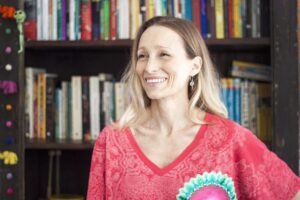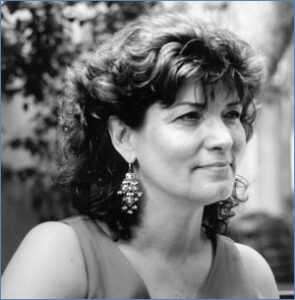HEATH WING interviews ALISON ENTREKIN

When I met with Alison Entrekin for this interview, the first thing I noticed was all the books she carried with her: fat dictionaries, field guides on botany, one on the birds of northeastern Brazil—the type of book generally known only to birdwatchers and ornithologists—not to mention a copy of Dylan Thomas’s 1954 radio drama, Under Milk Wood. I thought, only in the hands of a translator, an obsessive sort of word junkie like Alison, could such an assortment of books assemble.
We sat down to discuss her work in a coffee shop/bookstore in Santos, Brazil. As we made small talk, Alison, almost in passing, nodded toward the bookshelf above us lined with guidebooks on Brazil for gringo tourists. She explained that she had translated many of these guidebooks into English, a long time ago. She told me this, it seemed, neither to emphasize the extent of her work, which is no doubt impressive, nor to boast—and there is much to brag about—but in a self-reflective sort of manner, more to herself, as if surprised by how far she has come, from translating tourist guidebooks to now being the most sought after English translator of Brazilian literature. Her long list of translations includes works like City of God by Paulo Lins, Cristovão Tezza’s The Eternal Son, Chico Buarque’s Budapest, Clarice Lispector’s Near to the Wild Heart, and Blood-Drenched Beard by Daniel Galera.



 This interview is the sixth in a new series, Writers on Writing, which focuses on craft and process. The series is part of The Common’s 10th anniversary celebration.
This interview is the sixth in a new series, Writers on Writing, which focuses on craft and process. The series is part of The Common’s 10th anniversary celebration. Frances Richey
Frances Richey










 This interview is the third in a new series, Writers on Writing, which focuses on craft and process. The series is part of The Common‘s 10th anniversary celebration.
This interview is the third in a new series, Writers on Writing, which focuses on craft and process. The series is part of The Common‘s 10th anniversary celebration. Kritika Pandey
Kritika Pandey
 This interview is the second in a new series, Writers on Writing, which focuses on craft and process. The series is part of The Common‘s 10th anniversary celebration.
This interview is the second in a new series, Writers on Writing, which focuses on craft and process. The series is part of The Common‘s 10th anniversary celebration. Ama Codjoe
Ama Codjoe